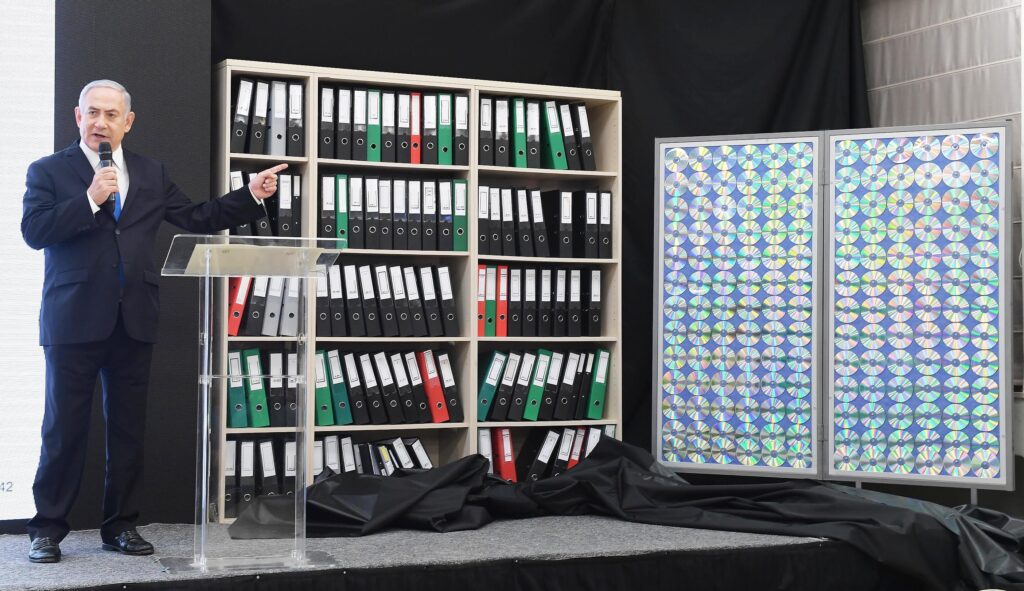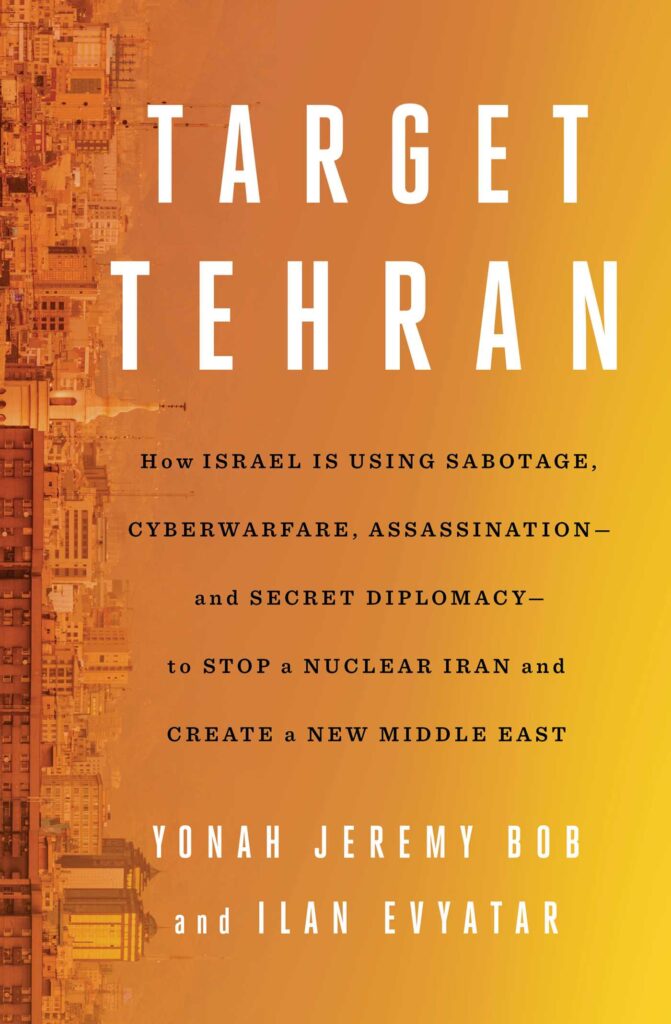Australia/Israel Review
Biblio File: Clandestine war
Feb 27, 2024 | Paul Monk

 Target Tehran: How Israel Is Using Sabotage, Cyberwarfare, Assassination and Secret Diplomacy to Stop a Nuclear Iran and Create a New Middle East
Target Tehran: How Israel Is Using Sabotage, Cyberwarfare, Assassination and Secret Diplomacy to Stop a Nuclear Iran and Create a New Middle East
by Yonah Jeremy Bob and Ilan Evyatar
Simon and Schuster, 2023, 368 pp., A$55.00
In June 2018, I reviewed Ronen Bergman’s then newly-published masterpiece Rise and Kill First: The Secret History of Israel’s Targeted Assassinations. I acclaimed both the access Bergman got and the extraordinary quality of his judgements on the subject. When planning to travel to Israel last year, before the Gaza War broke out, I got in touch with him and we agreed to meet. The war has put that meeting on hold.
Bergman is among the most qualified and gifted analysts of Israeli strategic and intelligence affairs. He is the benchmark against which I found myself assessing Target Tehran, as I read it. This is not least because Bergman is also the author of The Secret War with Iran, looking back over a 30-year clandestine struggle by Israel, after 1979, to keep the fanatical mullahs in Teheran boxed in.
Target Tehran sits squarely alongside Bergman’s work, with regard to both targeted assassinations and containing Iran. However, it also covers the brilliant capture, in January 2018, of a mass of Teheran’s archival documentation about its secret nuclear weapons program, and the extraordinary making of the Abraham Accords of August/September 2020. It was sent to press in April 2023, however, therefore missing the shock of the October 7 Hamas assault on Israel and the challenge the consequent war has posed to the new order that the Abraham Accords created.
Target Tehran is beautifully constructed, with 15 chapters, a “Primary Cast of Characters” at the beginning, followed by the Introduction, and a “Supplemental Cast of Characters” at the end. It has 62 pages of endnotes and an 18-page index, making it highly researcher-friendly. It is written in an accessible and well-paced style and the stories it tells are remarkable. It is certainly worth reading, just as a book. But the subject is vital.
The Primary Cast of Characters begins with the four individuals who have headed Israel’s Mossad external intelligence service since 2002: Meir Dagan, Tamir Pardo, Yossi Cohen and David Barnea. Each of them emerges from the pages of this book as a complex and highly intelligent personality who served the state of Israel diligently and faithfully over the past two decades. In many ways, the book is the story of their leadership of the Mossad in a midnight death struggle with Iran.
The Mossad has been a legendary secret intelligence and black operations service for decades. But few of its tasks have been more challenging than the long attempt to prevent Iran from acquiring nuclear weapons, given the avowed intention of the Iranian theocratic regime to obliterate Israel if it can.
This is, of course, a sub-set of the existential threats Israel has had to confront since its founding in 1948. But it is, perhaps, the most dangerous of them all.
The current war in Gaza, in which Iran is openly backing Hamas, while arming Hezbollah in Lebanon and unleashing the Houthis in the Red Sea, is evidence enough of Iran’s hostility right here and now. But it is in this very context that Rafael Grossi, head of the International Atomic Energy Agency (IAEA), announced in late January that Iran now has enough highly enriched uranium to make several atomic bombs.
The 2015 nuclear deal (JCPOA) is a dead letter now. Iran has clearly violated all the protocols of that agreement and shown no inclination to return to the negotiating table, despite conciliatory moves from the Biden Administration.
It was remarkable to see the IAEA statement come out even as I was reading Target Tehran, with its gripping account of all the things Mossad had done over many years to hinder, delay or sabotage Iran’s nuclear weapons work. In 2008, President George W. Bush visited Israel and insisted to the then PM Ehud Olmert and Defence Minister Ehud Barak that Israel must not make a pre-emptive attack on Iran’s nuclear facilities. The same debate recurred later at the top of the Israeli government: Netanyahu and Barak vs their military and intelligence chiefs. Now what?
One thing should be absolutely clear. Throughout the past 20 years and more, when Teheran declared that it didn’t have a nuclear weapons program and that the outside world was trying to prevent it from peacefully developing nuclear energy, it was lying through its teeth. It was doing exactly what North Korea did in the 1980s and early 1990s – professing to abide by IAEA inspections and standards, while clandestinely pursuing a weapons capability.
The capture of its nuclear archive in 2018 demonstrated this. It has now simply been confirmed by Grossi, six years later. Iran has no credibility making demands for concessions in exchange for restraint. And the prospects for a new and more effective agreement to replace the JCPOA are surely very poor, given both the high tensions between the US and Iran right now and the prospect of a return of Donald Trump to the White House in 2025.
These are all good reasons to read Target Tehran. But it should be read in conjunction with Trita Parsi’s two books on Obama, Iran and the JCPOA: A Single Roll of the Dice (2012) and Losing An Enemy (2017). Those two books trace the diplomacy that led to the imperfect agreement with Iran to put on hold a program it had so long denied it had at all.
Obama’s claim was that the JCPOA would buy time for things to change. Mossad had been trying, for many years, to buy time by other means. Now, says Grossi, we are racing against time if we want to dissuade Iran from weaponising its enriched uranium.
But I digress. The opening chapter of Target Tehran is called The Heist. It tells the story of how Yossi Cohen oversaw a meticulously planned operation to break into a warehouse in the Shirabad industrial suburb of Teheran to remove and spirit out of Iran “files, physical and electronic, that contained the entire record of Iran’s strenuous effort to become a nuclear-armed power going back to its beginnings nearly thirty years before.”
The book is worth reading for this chapter alone, but many readers will be drawn to its accounts of sabotage by cyber weapons (think Stuxnet, developed jointly by Israel and the US) and the assassination of key scientists and project leaders. A long succession of such operations is laid out in detail, along with the deliberations and planning that went into them. The assassination of Qasem Soleimani, IRGC boss and top figure in Iran’s weapons programs and terrorism operations, was contemplated a number of times before finally being successfully carried out by the US, not by Israel.
But the sheer technological wizardry developed and deployed by Israel, by Mossad, is deeply impressive. Antony Loewenstein has accused Israel of using “Palestine” as a laboratory for testing surveillance and intervention technologies, but what Bob and Evyatar show is how such innovations were deployed against the rogue power Iran by way of trying to show it, as Yossi Cohen put it in 2020, “Israel is not going to let you get nuclear weapons – what don’t you understand?”
The authors make clear that one reason Mossad was able to operate with such success in Iran is that Iran has many dissident movements willing to help Israel against the mullahs. But they also point out that, between 2009 and 2021, there was a long running and disruptive turf war within Iran, between the IRGC (Islamic Revolutionary Guard Corps) and MOIS (the Ministry of Intelligence and Security) – which Mossad adroitly exploited.
And so, in 2024, we have come to a fateful juncture. Iran has weapons-grade uranium, the JCPOA is defunct, the Biden Administration is struggling to keep conflict with Iran and its proxies from escalating in the Middle East and there is a US presidential election approaching.
Read this book as the gripping drama unfolds. It tells of an ingenious and protracted campaign against a singularly intractable and unpleasant regime to hold it to account for its lies and prevent it from fulfilling its malign ambitions. Had it not been for the Mossad’s protracted secret war, one is forced to conclude, Iran would already be nuclear-armed.






